Fundamentally, this Saturday’s recall vote on 24 Chinese Nationalist Party (KMT) lawmakers is a democratic battle of wills between hardcore supporters of Taiwan sovereignty and the KMT incumbents’ core supporters.
The recall campaigners have a key asset: clarity of purpose. Stripped to the core, their mission is to defend Taiwan’s sovereignty and democracy from the Chinese Communist Party (CCP).
They understand a basic truth, the CCP is — in their own words — at war with Taiwan and Western democracies. Their “unrestricted warfare” campaign to undermine and destroy Taiwan from within is explicit, while simultaneously conducting rehearsals almost daily for invasion, blockade or quarantine.
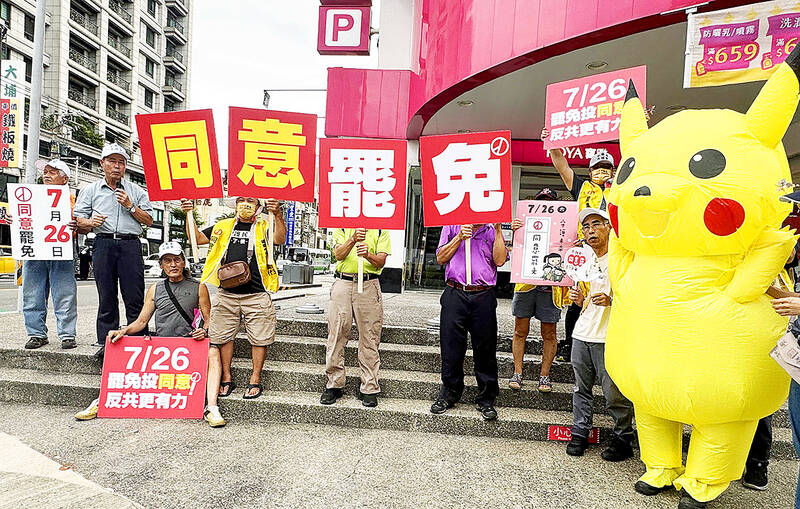
Photo: Lee Jung-ping, Taipei Times
There is some irony in this, as the CCP is using the same tactics they employed to bring down the KMT government in China, updated with modern technology.
The recall campaigns make the case that the KMT legislative caucus, aided by their allies in the Taiwan People’s Party (TPP), have in effect been acting on behalf of the united front to slash defense spending, hobble the basic functioning of the administration, hamper efforts at building community resilience, undercut diplomatic missions and throw the Constitutional Court into a constitutional crisis after it ruled against their attempt to turn the legislature into a judicial and prosecutorial body.
Their case is bolstered by regular visits by top KMT figures to meet top officials in China, including Wang Huning (王滬寧). Wang is effectively in charge of crafting CCP plans to annex Taiwan, serving as the number two on the Central Leading Group for Taiwan Affairs under Xi Jinping (習近平), as well as being in charge of the united front.
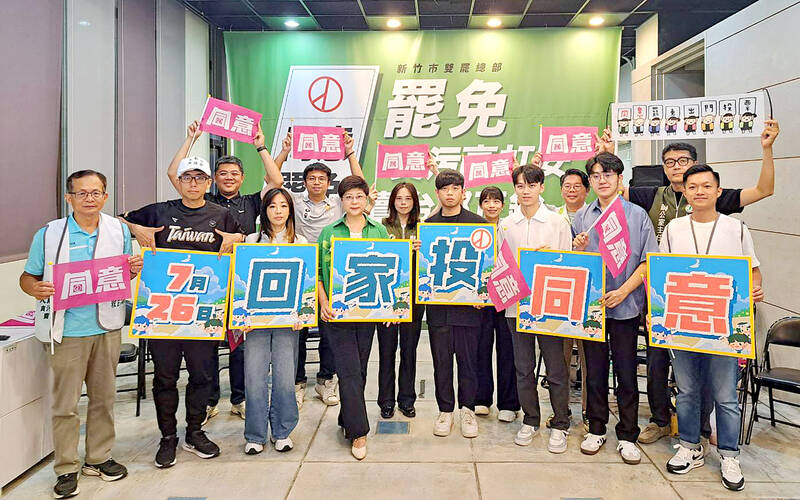
Photo: Hung Mei-hsiu, Taipei Times
The KMT is united with the CCP in supporting the “one China principle” that Taiwan is a province of China, and though they may differ on the timeline and method of Taiwan’s annexation, they ultimately share this same goal.
The KMT touts their “2D” strategy of “dialogue” and “deterrence” and insist they will ensure a rigorous national defense to back up dialogue intended to reduce tensions across the Taiwan Strait. They vigorously campaigned on this in the election last year and insisted they would increase defense spending to 3 percent of GDP, a number since upped to 3.5 percent.
They are undermined by three very significant problems.
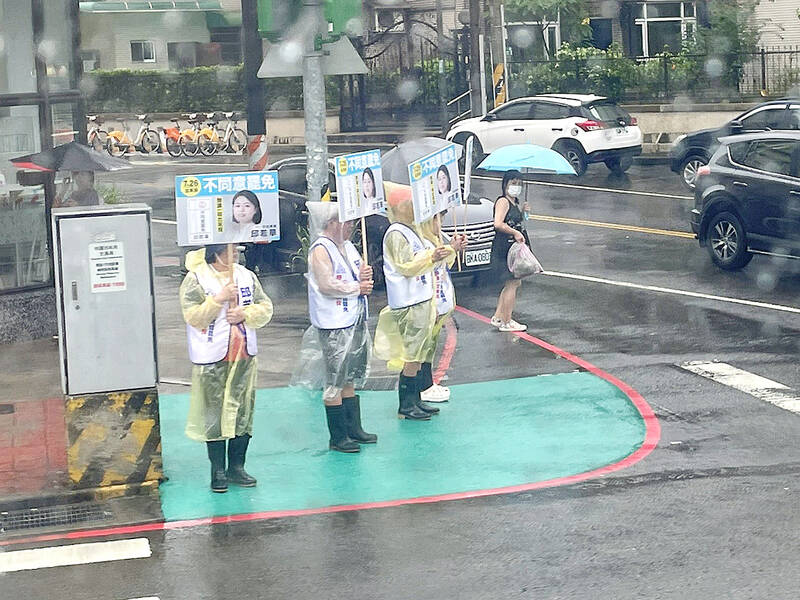
Photo: Cheng Shu-ting, Taipei Times
The CCP insists they will only conduct dialogue based on the “one China principle,” which is embodied in the so-called “1992 consensus,” which is hugely unpopular, but supported by the KMT
The second problem is that the KMT campaigned on similar promises in every election since 2008, but when in power, then-president Ma Ying-jeou’s (馬英九) KMT administration let defense spending wither to under 2 percent of GDP and significantly ramped up negotiations with the CCP. Ma has since all but admitted he was laying the groundwork for annexation into China.
Recent actions by the KMT legislative caucus are the third problem, which run counter to their campaign promises. Realizing how bad this looks, they have recently unfrozen many key budget items, including in defense, but they have not undone the cuts already imposed.
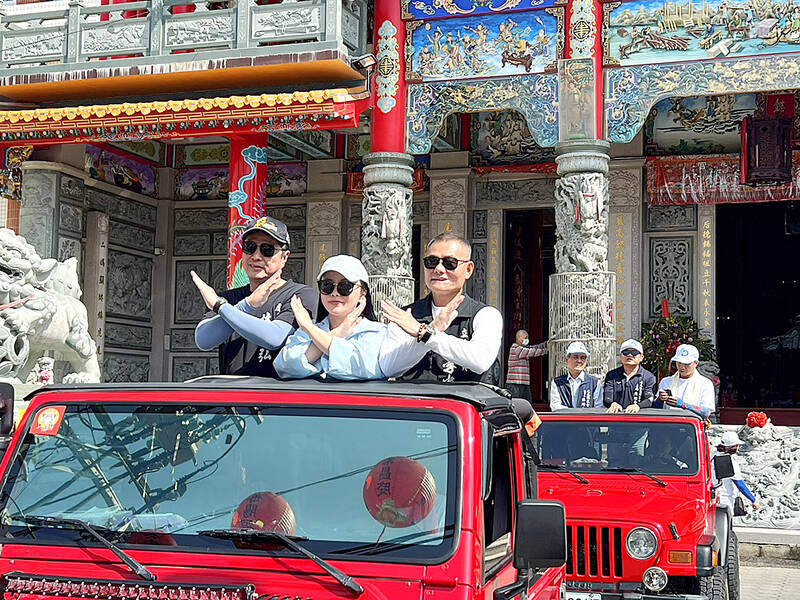
Photo: Huang Shu-li, Taipei Times
KMT RESPONSE
As the recall campaigns against their lawmakers gained momentum, the KMT initially countered with two fairly rational points.
The first is that they were elected to provide oversight over the administration. The clearest nationwide test of this is the proportional representation party list voting in the election last year. Combined, the KMT-TPP alliance was voted in proportions suggesting the public did want a legislative counterbalance to the administration, though with no individual party having outright control.

Photo taken from Threads
The second is that the recall campaigns were trying to overturn the election last year by distorting the intention of the recall laws. To succeed, recall campaigns only need to win over a quarter of the electorate, and outnumber the no votes, a much lower bar than a general election.
The recall campaigns claim that the KMT-TPP alliance has betrayed campaign promises and are effectively aiding the CCP. Additionally, a successful recall leads to a byelection, which means the ultimate decision on which party controls the seat remains with the general electorate.
Motivated by an existential fear of losing Taiwan to the CPP, the recall campaigners have been fiercely dedicated, pounding the pavement rain or shine, working long hours and giving up their lives to get every recall signature they could.
Lacking the sense of purpose and mission of the anti-KMT recall campaigners, the KMT’s attempts at generating recall campaigns against DPP lawmakers quickly fell apart. The situation was so bad that many KMT local leaders and campaigners have confessed to copying party member roll information and forging signatures, with many more under investigation for voter fraud.
Increasingly alarmed, the KMT turned to extreme and paranoid arguments. They liken “dictator” President William Lai (賴清德) to Hitler, the “authoritarian” administration is “more commie than the commies, more fascist than the fascists,” and are now insisting that the Lai administration declaring martial law is imminent.
Their evidence to back these claims is weak to nonexistent. President Lai has signed into law every constitutional law passed by the KMT-TPP controlled legislature, even the ones extremely detrimental to his administration — hardly the act of a dictator.
But that is irrelevant to the core of the electorate that already hates the DPP.
KMT STRENGTHS
Some factors favor the KMT. Most importantly, not only do more people in most districts oppose the recalls than support them, the recalls are all happening in districts where voters chose the KMT to represent them.
A study prior to the 2022 local elections found in most regions of the country, voters supported the KMT primarily because they “hated” the DPP, with lower numbers choosing the party because they liked it. While that indicates relatively low loyalty to the KMT, intense dislike for the DPP will drive voter turnout.
In some districts, KMT incumbents are popular, and in others there are local patronage factions with solid get-out-the-vote apparatus. Additionally, never discount the effectiveness and professionalism of the KMT.
Indications are that voter turnout across the board will be high. This increases the likelihood that the recall campaigns will pass the minimum threshold of one quarter of the electorate voting in their favor in many districts.
The critical test will be if the votes on their side outnumber those supporting the incumbents. Because the threshold is so low, both sides have used fear-based appeals to their bases, which easily count for a quarter of voters.
The KMT has overall numbers on their side in most districts, but the pro-recall campaigns are more driven and motivated.
Voter turnout on both sides will be decisive.
The weather forecast is for “cloudy with occasional showers or thunderstorms” for much of Taiwan. Bad weather favors the recall campaigners, good weather the KMT, but the weather report suggests it could go either way.
POTENTIAL OUTCOMES
If many recalls are successful, it will lead to two outcomes.
Many politicians will start looking over their shoulder and play it safer. Controversy that raises media profile works in partisan districts in general elections, but an angry minority can be victorious in a recall, raising the risks.
There will also be discussions on whether the recall thresholds are too low. Whether those discussions go anywhere will be interesting to watch, as both sides have used this to their advantage at different times.
If many recalls are successful, initially I doubt it will provoke much serious introspection within the KMT, especially if only controversial lawmakers are recalled. The results of the byelections could change this.
If the KMT loses enough that the DPP regains a legislative majority, they may start to reconsider their party platform. But just maybe, after all three straight losses for the presidency has not produced much meaningful change in the party.
Donovan’s Deep Dives is a regular column by Courtney Donovan Smith (石東文) who writes in-depth analysis on everything about Taiwan’s political scene and geopolitics. Donovan is also the central Taiwan correspondent at ICRT FM100 Radio News, co-publisher of Compass Magazine, co-founder Taiwan Report (report.tw) and former chair of the Taichung American Chamber of Commerce. Follow him on X: @donovan_smith.

From the last quarter of 2001, research shows that real housing prices nearly tripled (before a 2012 law to enforce housing price registration, researchers tracked a few large real estate firms to estimate housing price behavior). Incomes have not kept pace, though this has not yet led to defaults. Instead, an increasing chunk of household income goes to mortgage payments. This suggests that even if incomes grow, the mortgage squeeze will still make voters feel like their paychecks won’t stretch to cover expenses. The housing price rises in the last two decades are now driving higher rents. The rental market

July 21 to July 27 If the “Taiwan Independence Association” (TIA) incident had happened four years earlier, it probably wouldn’t have caused much of an uproar. But the arrest of four young suspected independence activists in the early hours of May 9, 1991, sparked outrage, with many denouncing it as a return to the White Terror — a time when anyone could be detained for suspected seditious activity. Not only had martial law been lifted in 1987, just days earlier on May 1, the government had abolished the Temporary Provisions Effective During the Period of National Mobilization for Suppression of the Communist
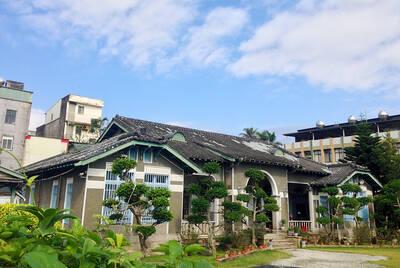
When life gives you trees, make paper. That was one of the first thoughts to cross my mind as I explored what’s now called Chung Hsing Cultural and Creative Park (中興文化創意園區, CHCCP) in Yilan County’s Wujie Township (五結). Northeast Taiwan boasts an abundance of forest resources. Yilan County is home to both Taipingshan National Forest Recreation Area (太平山國家森林遊樂區) — by far the largest reserve of its kind in the country — and Makauy Ecological Park (馬告生態園區, see “Towering trees and a tranquil lake” in the May 13, 2022 edition of this newspaper). So it was inevitable that industrial-scale paper making would

Hualien lawmaker Fu Kun-chi (傅?萁) is the prime target of the recall campaigns. They want to bring him and everything he represents crashing down. This is an existential test for Fu and a critical symbolic test for the campaigners. It is also a crucial test for both the Chinese Nationalist Party (KMT) and a personal one for party Chairman Eric Chu (朱立倫). Why is Fu such a lightning rod? LOCAL LORD At the dawn of the 2020s, Fu, running as an independent candidate, beat incumbent Democratic Progressive Party (DPP) lawmaker Hsiao Bi-khim (蕭美琴) and a KMT candidate to return to the legislature representing